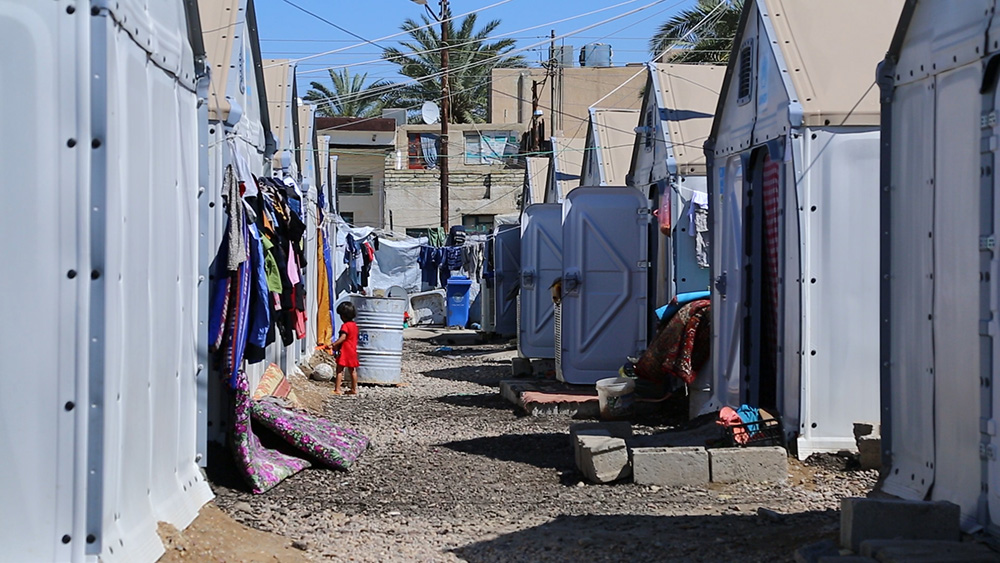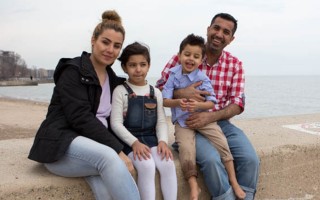Jamal dreams of expanding his little shop to better support his family.
He and his family fled their home in Falluja, Iraq.
By: Caroline Gluck
Jamal Naji, 37 years old:“We were living in Falluja. War planes flew overhead and were bombarding us so we sold everything and left. It was very hard to leave Falluja – it was a tragedy. We sold everything to be able to leave. We have been here for two years in Al Khadra’a camp. I am disabled but God gave me this little shop so I can live and support my family. I don’t have to ask anyone to give me anything. And, thanks to God, I’m surviving.
“We are a family of 11 people and I’m earning a living for the family through this shop, selling snacks and sweets. It’s been eight months now since I opened the shop. The lesson I learned from life is not to depend on others but to support my family myself, without anybody’s help.”
“My daughter was born in Falluja. She was seven months old when that terrible attack began in the city and we left. She’s spent two years in the camp. I hope my daughter can grow up, and can go to school. I hope I can live long enough to help support her.”
“God is merciful. I wish we can go back to our old neighborhood and live as one family, God willing.”
Jamal Naji, 37, has muscular dystrophy. He cannot walk and relies on a wheelchair to get around. He fled his home of Falluja, Iraq, when extremists took control of the city two years ago. His home and store were destroyed. His father was killed by an extremist and one of his brothers was injured. His seven brothers and four sisters are now scattered all over Iraq. He lives in Al Khadra camp for displaced Iraqis in Baghdad, alongside more than 600 other people.
Across Iraq, more than 3.4 million people have been displaced due to conflict and are living in thousands of sites across the country.
Jamal runs a small store from his shelter at the camp. He sells snacks, crisps and biscuits, as well as cold drinks and ice. He has been able to support his 11 family members through his entrepreneurship. Jamal is very proud to have his store and to be able to support his entire family. He does not like having to rely on others to help.
His dream is to expand his business to be better able to provide for his family.
His daughter, Farah, was born in Falluja. He is excited to watch her grow up and is looking forward to seeing her walk and go to school.
He is yearning for his home city to be peaceful enough for everyone to return and for his separated family to move back and live together once again.
Written & Video by Caroline Gluck
Show your solidarity with refugees like Jamal by signing the #WithRefugees petition today.
Did you like Jamal’s story? Share it with your friends!
Ongoing violence in Iraq has led to successive waves of mass displacement and a deepening humanitarian crisis. Iraq now has the third largest population of internally displaced people (IDPs) in the world, with 3.2 million people displaced in the country since January 2014.
IDP and returnee families suffer from a severe housing shortage and inflation of rent, often living in overcrowded and substandard dwellings or in destroyed or damaged homes. While some 220,000 IDPs are living in 25 formally established IDP camps, a majority of IDPs have found alternative solutions in informal collective settlements, such as empty school buildings, religious compounds and unused government structures. Approximately 65,000 IDP families are also living in unfinished houses and buildings.
More stories
Majid fled war in Iraq.
He dreams of a good education for his children.
Mojtaba escaped from Taliban violence.
He dreams of finding a cure for cancer.
Diego and his family fled the conflict in Colombia.
He dreams of getting his degree in mechanical engineering.








